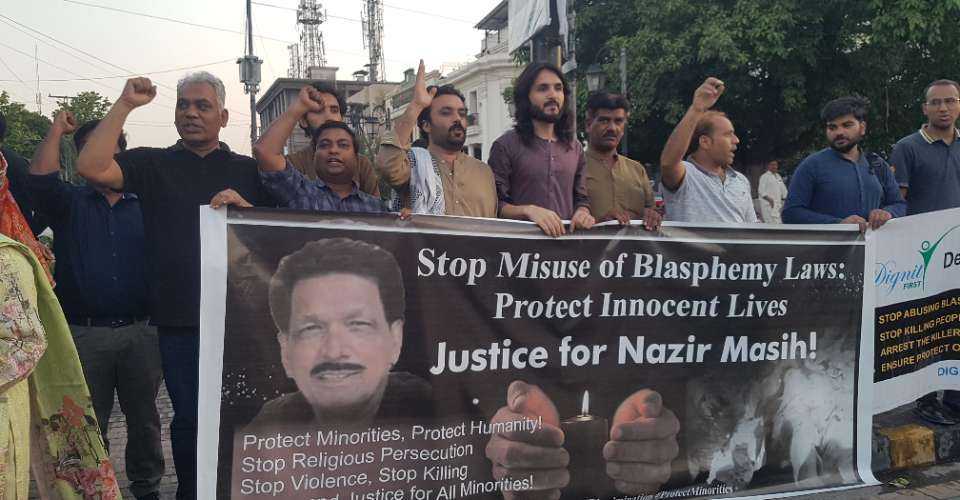
Christians join a rally to demand repeal of Pakistan's blasphemy law in Lahore on June 8. (Photo: Kamran Chaudhry/UCA News)
Some 300 Christians marched on the legislature in Pakistan’s Punjab province at the weekend, joining global calls for the repeal of the country's draconian blasphemy laws days after a Christian lynching victim died in hospital.
During the protest on June 8 in Lahore, the provincial capital, the protesters condemned the government for failing to stop recurrent Muslim mob attacks based on false allegations of blasphemy.
The demonstrators placed lit candles on a table around a picture of Nazir Masih, the 74-year-old Christian who died on June 3 days after a Muslim mob attacked and injured him in Punjab's Sargodha district.
“The government should stop patronizing extremist religious outfits. Minorities are now afraid to sleep fearing someone will drop blasphemous material in front of their house. The whole community is punished resultantly,” said Samson Salamat, chairman of Rawadari Tehreek, a group promoting peaceful coexistence among all segments of society, at the rally.
Salamat referred to the case of Masih who was attacked after rumors spread that he burned pages of the Quran on May 25.
"We demand new legislation against false and fabricated blasphemy allegations and an independent inquiry into all blasphemy incidents and mob attacks on the Christian community," Salamat said.
On June 3, UK-based global Christian group, Christian Solidarity Worldwide (CSW), issued a strongly worded statement demanding the end of Pakistan’s blasphemy law.
“We also continue to call on Pakistan to repeal its blasphemy laws, which are wholly incompatible with the country’s national and international commitments to freedom of religion or belief,” said Mervyn Thomas, CSW’s founding president.
Thomas also expressed his condolences to the family of Masih, “whose life was cruelly taken by extremists who have been emboldened by Pakistan’s controversial blasphemy laws and the culture of impunity that surrounds those who take these laws into their own hands. Masih would likely still be alive had the police intervened sooner and more effectively.”
Muslims make up the majority of Pakistan’s estimated 241 million people and Christians and Hindus make up about 1.6 percent each.
Pakistan’s Penal Code makes blasphemy against Islam and the Prophet Mohammad serious criminal offenses, punishable with life and death sentences.
Dozens of people including Muslims and non-Muslims have been arrested and jailed for blasphemy since the 1980s, but no one has been executed.
However, allegations of blasphemy have triggered mob killings and attacks on houses and worship places by Muslim conservatives.
According to the Lahore-based Christian human rights group, Center for Social Justice, seven persons became victims of extrajudicial killings stemming from blasphemy allegations across the country last year. Four cases were recorded in Punjab, Pakistan’s most populous province.
Between 1994 and 2023, a total of 95 persons accused of committing blasphemy were killed in mob attacks, the group said.
In 2016, Mumtaz Qadri, the police guard who killed former Punjab governor Salman Taseer, was sentenced to death and executed by hanging. To date, it remains the only case of justice for a blasphemy-related killing.
Qadri assassinated Taseer in 2011 for his support of Catholic woman Asia Bibi who was sentenced to death for blasphemy and spent years on death row before her acquittal and release in 2018.
Joseph Jansen, advocacy officer at the European Union and the United Nations representing the Jubilee Campaign Netherlands, highlighted the dangerous correlation between blasphemy laws and the resulting mob violence.
“Despite calls from UN Human Rights Committee, the European Parliament's 2021 resolution to repeal or amend the blasphemy laws, they remain incompatible with the International Covenant on Civil and Political Rights. Instead, recent developments have made these laws stricter, exacerbating the plight of religious minorities,” he told UCA News.
In August last year, parliament amended and passed the Criminal Laws (Amendment) Bill, increasing punishment for insulting the Prophet’s companions, wives, and family members to 10 years along with a fine of 1 million rupees (US$ 3,572).
According to Liaqat Ali, a senior lawyer in Lahore, six blasphemy cases were registered in Punjab's capital last month. Four Muslims and two Christians, including a woman, were accused.
Without genuine political will nothing can change on the blasphemy, he said.
“Allegations can be made against anybody but none of the political parties has the guts to repeal this law. The only solution is to introduce legislation to criminalize false allegations and give the same punishment and compensation to the accusers,” he said.


